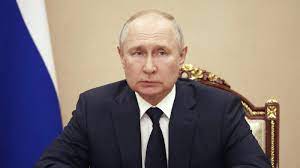Lisa Haseldine
Yevgeny Prigozhin’s march on Moscow may have been aborted, but two weeks on the Kremlin is still reeling from his overt challenge to Vladimir Putin’s power. According to reports, the Russian Ministry of Internal Affairs (MVD) has gone so far as to run an initial inquiry into levels of public support, gauged by monitoring social media posts and internet searches by ordinary Russians.
Its findings, intercepted and leaked by Ukrainian intelligence, suggests that 17 of Russia’s 46 regions sided with Prigozhin. Putin had support from just 21 regions, while the remaining eight remained split. Moscow apparently backed the Russian President, but his home city of St Petersburg was ready to throw its support behind the Wagner chief. Public support for Prigozhin in the republic of Dagestan was reportedly as high as 97 per cent.
If the report is accurate – any wartime leak should be taken with a pinch of salt – surely the only conclusion is that Putin is not only in an extremely precarious position, but that the country may be on the edge of civil war. It’s not just wishful thinking: the country has a history of failed coups leading to political upheaval. Speaking to the Kremlin-opposed Russian news outlet Meduza, two regional government sources said that Putin’s officials had called a crisis meeting with regional leaders and Russian embassies to shore up support. These are not the actions of a comfortable administration. Perhaps Putin is finally waking up, realising that the nation he thought he’d had in his palm could soon scatter. During the Covid lockdowns and in the months since the invasion, he became a near-recluse, seldom photographed outside the Kremlin. But in recent days he has been popping up across the country for meet and greets with the public. Dagestan was one of the first places he visited. And earlier this week, Putin announced that the region would be given £40 million in local infrastructure investment. If it looks like a panicked response to public unrest, then it probably is.
And what are we to make of Prigozhin’s walkabout? Under the terms of the Belarus-brokered truce with Moscow, he is supposed to have self-exiled in Minsk, but he is now said to be at large in St Petersburg. The Kremlin said that it doesn’t know or care; that it doesn’t have the capabilities to keep tabs on him. Some might argue it’s an attempt to avoid legitimising him – but failing to punish Prigozhin exposes Putin’s weakness and the fragility of his power. As for the Wagner group itself: in theory, it is being folded into the Russian army, but in practice, it’s actively recruiting from its new base in Belarus and isn’t shy about branching out once again to Russia. Telegram channels have called on subscribers to gather in St Petersburg this weekend at an event. “We will distribute t-shirts, patches, badges, stickers,” they promise. They don’t say that Prigozhin himself will show up, but he could.
Alexander Lukashenko, the Belarusian president, is still posing as the peacemaker, saying Prigozhin’s survival is proof not of Putin’s weakness but his magnanimity.
“You think that Putin is so malicious and vindictive that he [Prigozhin] will be killed somewhere tomorrow?” he said this week. “No, this will not happen.” But with Prigozhin supposedly at large in Russia and Wagner re-organising, it may be that the coup was merely a first attempt. And that the final blow is yet to come.
The Telegraph







